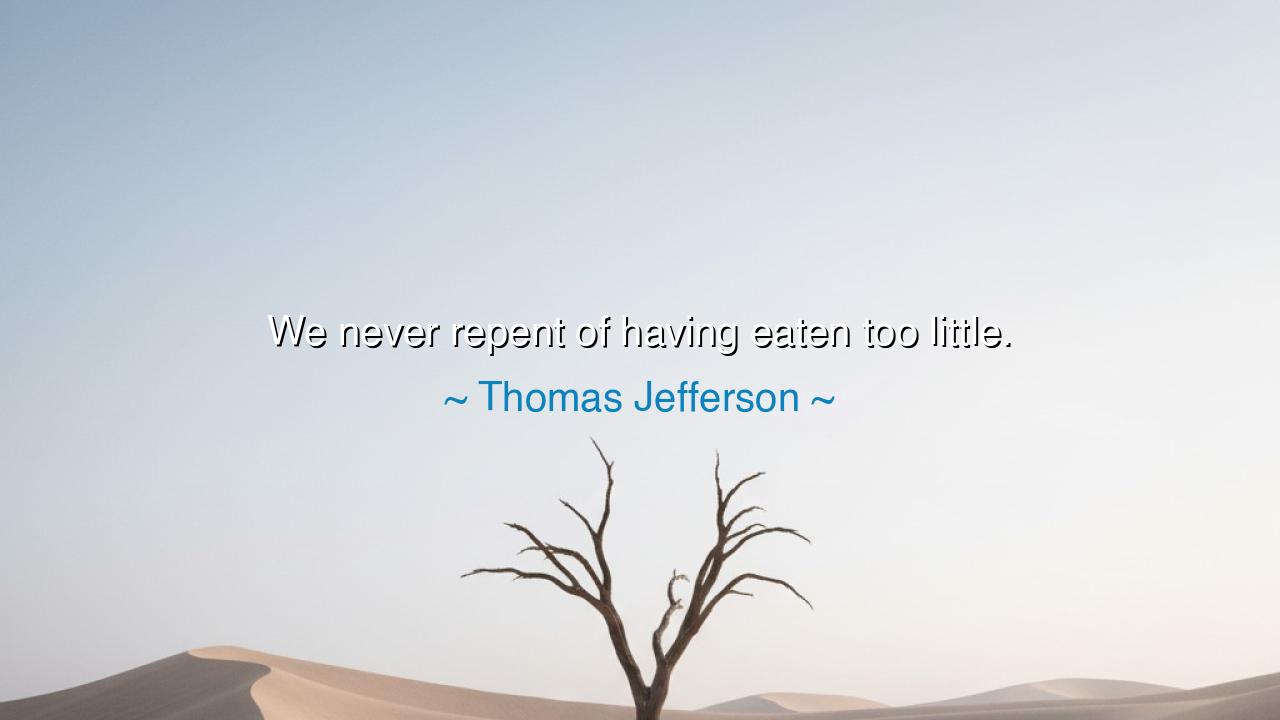
We never repent of having eaten too little.






When Thomas Jefferson wrote, “We never repent of having eaten too little,” he was not merely speaking of the table, but of the discipline of the soul. Within this brief and measured sentence lies a timeless truth: that restraint, though difficult in the moment, leads always to peace — while indulgence, though sweet upon the tongue, often leaves a bitterness behind. Jefferson, a man of reason and refinement, understood that moderation is the root of wisdom. His words echo like an ancient proverb, reminding us that the path to strength and clarity is often found not in addition, but in restraint.
In the age of Jefferson, food was not merely sustenance but an emblem of civility and culture. Yet even amid the abundance of Monticello, he saw how easily abundance could become excess. His observation is one of the mind, not just the body — for to “eat too much” is to overconsume in all things: in appetite, in wealth, in desire. The man who controls his hunger controls his life. The man who surrenders to it becomes its servant. Thus, Jefferson’s simple counsel carries the depth of the ancients: temperance is freedom, while indulgence is a subtle chain.
The ancients themselves knew this well. Pythagoras, the philosopher of harmony, taught his disciples to eat lightly, believing that a burdened stomach dulls both the mind and the spirit. Socrates, too, once said that “no man has ever regretted eating too little, but many have regretted eating too much.” Jefferson’s wisdom, though born in a new world, springs from that same eternal fountain. To eat little is not to deny pleasure — it is to master it, to savor without surrender. It is to remember that the body, when respected, becomes a faithful ally; when abused, it turns into one’s captor.
History offers countless proofs of this truth. Consider the story of Alexander the Great, conqueror of nations, who at his height lived simply, eating the same bread and drinking the same water as his soldiers. His strength did not come from feasts, but from discipline and moderation. Yet when later kings, heirs to his empire, drowned themselves in luxury, their kingdoms fell to ruin. For abundance without restraint corrupts not only the stomach, but the will. The banquet of excess has always been the prelude to the fall of empires.
Jefferson’s phrase also speaks to the quiet dignity of self-restraint, a quality that stands in defiance of the restless hunger of the modern age. To “eat too little” is to be satisfied with enough — to trust that peace is not found in the next bite, but in the stillness that follows the meal. It is a metaphor for life itself: how often do we regret the word spoken in haste, the passion pursued beyond wisdom, the possession grasped though it brought no joy? But who has ever repented of patience, of restraint, of having stopped before excess? His words are thus a call to simplicity, to contentment, to the noble art of enough.
There is also tenderness within his wisdom — for Jefferson knew that the body, like the earth, must be treated with balance. He believed that temperance was not a denial of pleasure, but its preservation. The one who eats lightly tastes more deeply. The one who lives with moderation lives more freely. It is not the feast that sustains us, but the mindful act of choosing well. When he wrote those words, Jefferson was teaching not only the art of eating, but the art of living — to measure every desire against the question: Will I regret this excess tomorrow?
So, my friend, let these words be a torch of guidance: "We never repent of having eaten too little." In every act — in food, in work, in love, in ambition — remember that moderation is the guardian of joy. The wise know that hunger is not our enemy, but our teacher; that desire, when mastered, becomes a source of strength. Eat to live, do not live to eat. Seek satisfaction in sufficiency. And when the feast of life is set before you, take what you need, savor it with gratitude, and rise with a clear heart — for you shall never repent of what you left behind.






AAdministratorAdministrator
Welcome, honored guests. Please leave a comment, we will respond soon